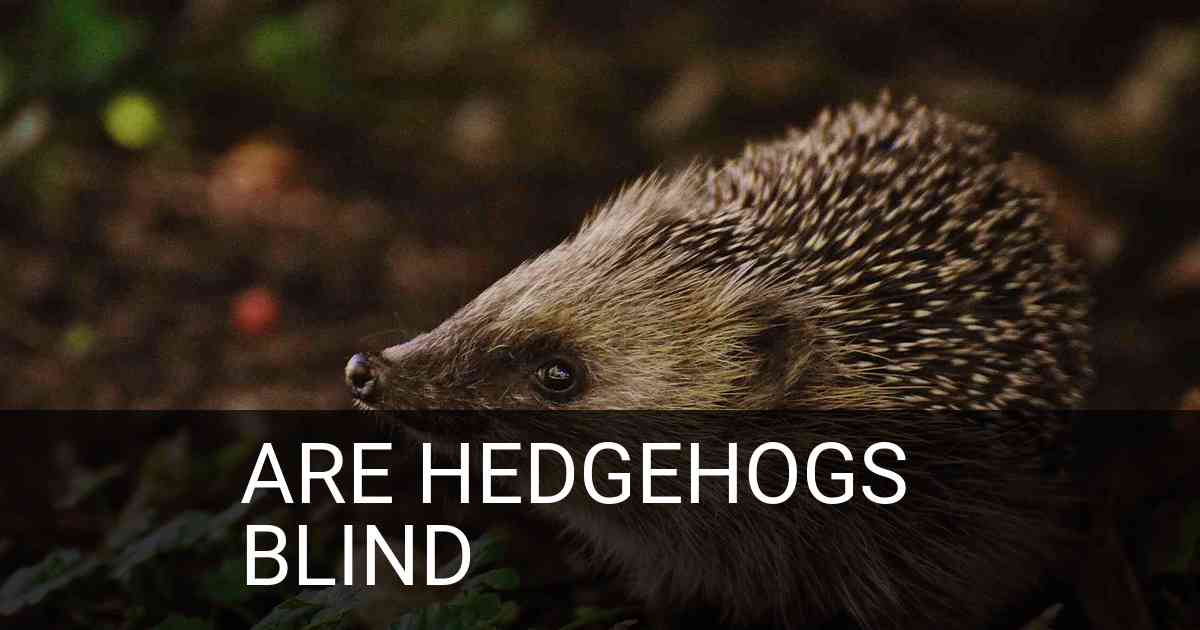
Hedgehogs may be small, round mammals, but do they have good vision? People often wonder if hedgehogs are blind or not. In this article we will explore the facts about hedgehog eyesight and answer the question: Are Hedgehogs Blind? We’ll look at what research has to say about hedgehog vision, as well as how their other senses make up for potential visual shortcomings.
Are Hedgehogs Blind?
No, hedgehogs are not blind. They do have poor vision compared to humans, but they are still able to see the world around them. Hedgehogs have small eyes that are located on the sides of their head and cannot move from side to side like human eyes can. However, this limited range of movement does not prevent them from seeing what is in front of them.
The Vision Of A Hedgehog
Hedgehogs use their vision for basic navigation and detecting predators or potential threats in their environment. While they may be able to spot a potential predator from afar, they rely more heavily on other senses such as smell and hearing when it comes to danger detection.
Making Up For Poor Vision With Other Senses
- Hearing: Hedgehogs have excellent hearing which helps make up for any visual limitations they may experience due to their eye size or placement.
- Smell: Hedgehogs also rely heavily on their sense of smell when navigating through unfamiliar terrain and tracking prey.
- Touch: In addition, hedgehogs will often use touch by feeling vibrations in the ground with their feet and nose in order to detect nearby objects or creatures.
How Sharp is a Hedgehog’s Vision?
Hedgehogs have poor eyesight, but they make up for it with an acute sense of smell and hearing. Their vision is not sharp enough to recognize individual faces or read signs, but it can help them find food and detect predators.
What Can Hedgehogs See?
Hedgehogs are short-sighted animals that mainly rely on their senses of smell and hearing to navigate the world around them. While they cannot see in great detail, hedgehogs can still make out shapes and movement from far away. This helps them identify potential sources of food or danger.
In addition, hedgehogs can perceive different colors, although not in the same way as humans do. They likely have poorer color perception than other animals such as birds or cats.
Adaptations For Poor Eyesight
Hedgehog’s poor eyesight has led to several adaptations that help them survive in the wild. These include:
- Heightened Sense Of Smell And Hearing: Hedgehog’s noses are highly sensitive and allow them to pick up on scents from far away distances which helps them locate prospective prey or detect predators.
- Whiskers: Hedgehog’s facial whiskers act as another means for detecting changes in their environment; this further enhances their ability to react quickly to potential dangers.
- Defense Mechanism: When threatened by a predator, hedgehog will curl into a ball so that its spines protect its more vulnerable areas like its face and underbelly.
Do Hedgehogs Recognize Humans?
Hedgehogs are often seen as independent, solitary creatures. They tend to be shy and skittish when around humans due to their wild nature. But do hedgehogs recognize humans on some level?
The answer is yes – hedgehogs can form bonds with humans and even come to recognize them over time. This means that they will become more comfortable in the presence of people they have grown familiar with.
How Do Hedgehogs Show Recognition?
Hedgehog recognition can manifest itself in several different ways:
- Physical contact: If your hedgehog shows signs of comfort when being held by you (e.g., reducing quills), this indicates that they have formed an attachment.
- Auditory cues: If your pet responds positively to your voice or other sounds associated with you (e.g., music), then it is likely that they recognize you.
- Scent recognition: If your pet appears more relaxed after smelling something that belongs to you (clothing, bedding etc.), then this suggests familiarity between you both.
Understanding a Hedgehog’s Blind Period
Hedgehogs are nocturnal animals, meaning that they spend most of their day sleeping and become active during the night. However, it is important to note that hedgehogs have a blind period between the months of October and February when they do not venture outside at all due to being in hibernation.
This means that hedgehogs will stay inside their dens for several weeks, emerging only rarely. During this time, hedgehogs will often lose weight as food sources become scarce or inaccessible during winter months. It is essential for owners of pet hedgehogs to ensure that there is enough food available for them during this time.
Reasons For The Blind Period:
- Food Sources: During the cold winter months, many natural food sources like insects are unavailable or difficult to find. This makes finding enough food to sustain themselves very difficult for these small mammals.
- Temperature Regulation: Hibernation enables hedgehogs to conserve energy and regulate their body temperature more efficiently. By staying inside their dens throughout the blind period, they can remain warm despite frigid temperatures outside.
- Mating Habits: In addition to providing warmth and protection from predators, hibernating also gives male hedgehogs an opportunity to travel long distances in search of potential mates without wasting valuable resources like food or energy.
It is important for pet owners to know about this blind period so that they can provide adequate care and nutrition for their beloved pets. Providing plenty of fresh water and nutritious foods like vegetables or fruits may help keep your pet healthy and active during the winter season!
Conclusion
Ultimately, the answer to whether or not hedgehogs are blind is a complicated one. While it’s true that they do have poor eyesight, this doesn’t necessarily mean that they’re completely blind. Their vision may be limited in some aspects, but their reliance on other senses such as smell and hearing helps them navigate their environment and find food sources.
In addition, their small size also gives them an advantage when it comes to avoiding predators. Therefore, although hedgehogs may have limited vision compared to some animals, they are still able to successfully survive in the wild by relying on their other senses and agility.

